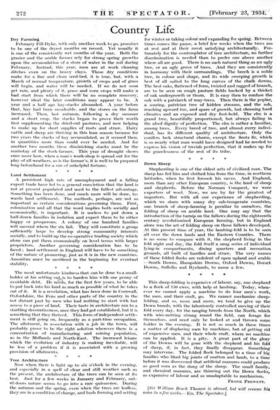This sheep-folding is expensive of labour, say, one shepherd to
a flock of 150 ewes, with help at lambing. Today, wben- ever we cannot apply a machine to do four men's work, the. men, and their craft, go. We cannot mechanize sheep- folding, and so, more and more, we tend to give up the Down breeds, with the laboriously controlled moving of their fold every day, for the ranging breeds from the North, which with wire-netting strung round the field, can forage for themselves, and need only be looked at and thrown some fodder in the evening. It is not so much in these times a matter of displacing men by machines, but of getting rid of expensive men, and their whole craft, where no machine can be. applied. It is a. pity.. A great part of the glory of the Downs will be gone with the shepherd and his fold of sheep, if, in fact, they finally disappear. Something may intervene. The folded flock belonged to a time of big families who liked big joints of mutton and lamb, to a time before it was discovered that artificial manures could produce as good corn as the dung of the sheep. The small family, and chemical manures, are thinning out the Down flocks, so expensive of labour and so unadaptable to mechanism.
FRANK FREW-Err.
[Sir William Beach Thomas is -abroad, bat rail resume hi4 tidies in a few weiks.—ED. The Spectator.]
















































 Previous page
Previous page